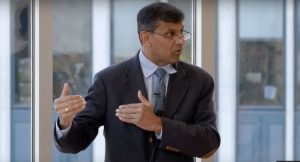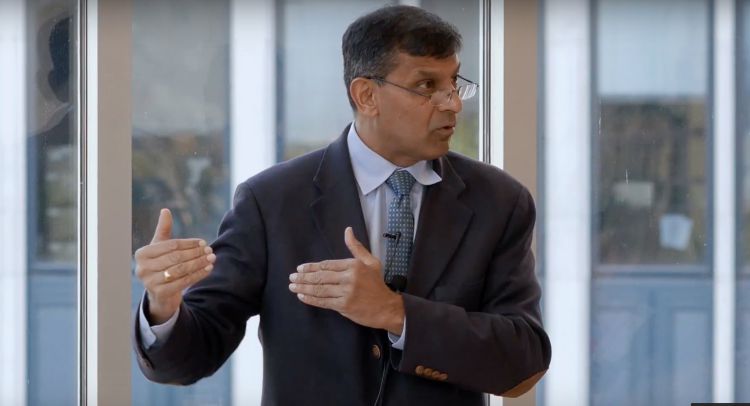The former governor of the Reserve Bank of India discussed the “concentrated and devastating” impact that technology and trade had on blue-collar communities, the anger toward “totally discredited” elites following the 2008 financial crisis, and the subsequent rise of populist nationalism during a keynote address at the Stigler Center’s conference on the political economy of finance.

The wave of populist nationalism that has been sweeping through Western democracies in the past two years is “a cry for help from communities who have seen growth bypass them.”
So said Raghuram Rajan, the former governor of the Reserve Bank of India, during a keynote address he gave at the Stigler Center’s conference on the political economy of finance that took place in June.
Rajan, a professor of finance at the University of Chicago Booth School of Business, spoke about the “concentrated and devastating” impact of technology and trade on blue-collar communities in areas like the Midwest, the anger toward “totally discredited” elites following the 2008 financial crisis, and the subsequent rise of populist nationalism, seen as a way to restore a sense of community via exclusion.
In his talk, Rajan focused on three questions related to current populist discontent: 1. Why is anger focused on trade? 2. Why now? 3. Why do so many voters turn to far-right nationalist movements?
“Pointing fingers at these communities and telling them they don’t understand is not the right answer,” he warned. “In many ways, the kind of angst that we see in industrial countries today is similar to the bleak times [of] the 1920s and 1930s. Most people in industrial countries used to believe that their children would have a better future than their already pleasant present. Today this is no longer true.”
Why Trade? “Trade is much more concentrated in its impact”
Much of the economic displacement we see today, argued Rajan, stems from “the effects of the IT revolution and its magnification by trade, which have become quite substantial.” As routine jobs get outsourced and automated, “moderate education no longer cuts it.”

The effects of automation and trade, he added, “have been very real: Angus Deaton and Anne Case, in their work on mortality rates, have found that between 1999 and 2013 we had 500,000 [additional] deaths amongst middle-aged white males [due to drugs, alcohol, and suicide]. Think about that number—500,000. On an annual basis, that’s about how many people were killed during the Vietnam War in the same kind of category: working age males. In that sense, there are 10 Vietnam Wars that have been going on over the last 14-15 years.”
This, said Rajan, “is very much like what happened to Soviet males after the demise of the Soviet Union, and it probably stems from despair and anger about the future. And this is going to get worse, because automation is proceeding at pace while the adjustment to that automation is not on track.”
The effect of trade on U.S. manufacturing jobs, he said, has been relatively mild compared with automation and technology. Acemoglu et al. estimated that 10 percent of the 5.8 million jobs lost in U.S. manufacturing between 1999 and 2011 have been due to Chinese imports. “Add to that industries affected by trade and you get 20 percent, so maybe one fifth.” Moreover, the share of manufacturing has held steady at about 12 percent of GDP for the past 30-40 years.
Nevertheless, said Rajan, “you don’t hear Trump railing against technology.” Much more anger has been directed at trade, he said, because “trade is much more concentrated in its impact.” Also, the loss of manufacturing jobs is affecting “segments of society which have few other options.”
“Think of a town where you have a factory closing down, and now you have high school-educated workers who were earning [well] in those manufacturing jobs. What are their options? Staying: there’s nothing to do, no sources of economic activity locally, apart from low paying ones. You can move and retrain, go upstream. Nursing is an expanding industry. If you could swallow the change, you can move and retrain—but that is costly and typically means moving to more urban centers, where the cost of living is higher. You can move and downgrade—there are tons of jobs as security guards, Uber drivers, and so on, but that doesn’t pay the bills.”
Instead, many choose to stay in place. “Mobility has fallen considerably, especially for the moderately educated,” said Rajan. “They are going to lesser and lesser well-paying jobs in the steel industry, until eventually they give up and essentially take early retirement.”
What that does, he said, is create “communities without economic activity where there’s social breakdown at the same time as economic breakdown: teenage pregnancies, divorces, drugs and alcohol. All related to things like the effects of trade, which can be quite substantial because they are so concentrated and devastating.”
Of course, Rajan noted, trade has had a large positive impact as well. “Where is that impact? In big cities, where the service-based expansion is taking place.” This contributes to the disconnect between the urban centers and more rural areas that have been deeply affected by trade: “One of the problems is that the economic impact of the forces I am talking about have been typically very concentrated away from the governance centers, which are located in the large cities.”
“It’s very easy if you’re in London to overlook what’s happening at the northeast of England, and if you’re in Washington, to overlook what’s happening in the Midwest,” explained Rajan. “Because around you things are actually quite good—there’s lots of activity, lots of economic hope.”
Why now? “The financial crisis was the straw that broke the camel’s back”
Still, there is the question “Why now?” The U.S, after all, has been experiencing a steady loss of manufacturing jobs for years. So why did the sudden surge of populist nationalism wait so long to manifest?
“The financial crisis was the straw that broke the camel’s back,” said Rajan. “Many of these people, especially white middle class workers, are essentially very much pro-market, very much for the competitive economy. What changed this market-oriented view? I think the global financial crisis sent a message that markets are corrupt. That all these bankers took the system into a big crisis and nothing happened to the bankers—the elite looked after themselves; no banker went to jail. And to boot: they don’t know how to get us out. For eight years we haven’t had growth in a serious way. We haven’t had the jobs that we want.”
Rajan cited the book Strangers in Their Own Land: Anger and Mourning on the American Right (The New Press, 2016) by sociologist Arlie Russell Hochschild, in which she spends time with disaffected workers in Louisiana. “Their vision of themselves is that they were standing in line, walking steadily toward the American Dream. And the line slowed, but they were OK with that, because that was the same line. And then they saw people ‘cut’ in front of the line: immigrants, women—all the people that liberal elite wanted to push ahead—and they never got any of the benefits.”
The financial crisis, he said, fueled the insurrection against liberal elites. “The liberal elite—that means you and me—has been totally discredited, because we didn’t know to prevent the financial crisis, and once it happened we didn’t know how to pull the economy out.”
This discreditation, said Rajan, contributed to the rise of populists, like Trump. “Immediately, you get a sense of why this person would get a kick out of voting for somebody that the liberal elite hates, someone who thumbs the liberal elite in the eye and says, ‘This is for you!’ Doesn’t matter if that person does any good: ‘That person gives me respect because he or she understands me, they talk my language and they don’t talk the language that those guys want to talk. They behave in a way that these guys hate—I like that.’”
Another factor, said Rajan, was the emergence of social media. “Every time that media has come to a new way of reaching people, it has allowed radical movements to spring strongly,” said Rajan. “Think of Father [Charles] Coughlin in the 1930s. He used to reach 28-29 million people through his radio broadcast. That’s how many people Trump reaches through Twitter.”
Why populist nationalism? “It is relative status that matters as much as absolute status”
Following Emmanuel Macron’s decisive victory over Marine Le Pen in France’s presidential election, there have been voices saying that the wave of far-right populism that washed over Western democracies in 2016 has been defeated.
Such predictions, suggested Rajan, may be too early: “They’ve been defeated in France, but they got 40 percent of the vote,” he said. Many voters, he explained, are attracted to nationalist populist movements because they promise a sense of community through exclusion.

“What is it that the right promises? There are two kinds of inequalities that are at play today,” said Rajan. “One is the inequality that the left focuses on: the top 1 percent, all those mega-millions being made by the elite. What they want is to tax and redistribute via government programs—the traditional left program,” said Rajan. “I would argue that there is an inequality that the right also focuses on: the majority middle, the white worker, slipping steadily into the ranks of the historically disadvantaged—the minorities, the immigrants.”
That, said Rajan, “is an inequality that they want to preserve. They don’t want to slip off the ranks of the lower-middle classes. They don’t want the guys who are helped by the government to get ahead of them. Why is Obamacare so hated by the Tea Party? Because it is an attempt to equalize, but a lot of the benefits go to the historically disadvantaged and not specifically to the lower middle class, which is slipping off the ladder.”
Despite a “general push” to reduce inequality, said Rajan, “some inequality is actually preferred, because it is the only source of ‘our’ status and it also reflects the fact that ‘we’ don’t like those guys pulled ahead of ‘us.’ Relative status matters as much as absolute status.”
The appeal of national populists, he said, can be partly attributed to the desire to recreate communities. “The populist nationalist is saying ‘I am going to recreate community for you—not your broken down community, beset by drugs and divorce, but a national community based on patriotism, based on people like you. ‘People like you’ is often the majority group, the majority color, the majority origin. It is an imagined community, à la Benedict Anderson.”
For this reason, emphasizing patriotism and tradition and de-emphasizing the liberalism of the elite, “which is essentially seen as a foreign implant,” can be very persuasive. “You are going to belong once again: you who were alienated, you who felt your social relationships are breaking down.”
Policies that spring from such movements, said Rajan, would necessarily emphasize short-term growth “without concern for the long-term consequences.” This emphasis would also imply less concern for respecting international institutions and agreements. As an example, Rajan cited the U.S. withdrawing from the Paris climate agreement. It also leads to less respect for central banks, “the quintessential elite.”
Anti-minority and anti-immigrant policies, said Rajan, “go with the territory,” but these kinds of policies are only “the first step.”
“Remember: there’s not much sense of community between people who share the same color—one could be Polish, one could be Lithuanian, and the other could be Italian. So over time, to maintain that sense of community, especially for people that come from different social and economic backgrounds, you need a stronger outside enemy. That is the worry, that these kinds of movements [will] morph from a sense of community to creating actual enemies that we have to be angry about.”
Drawing parallels to the 1930s, he argued, would be “too easy.” Exclusionary policies can be deeply problematic without historical parallels: “We have aging populations in every industrial country. Given the aging, someone has to pay the bills for the unfunded entitlements that have to be paid down the line. Without immigration, aging will be much faster because the majority community is essentially much slower in population growth. Given that, is it a good idea today to essentially tell the people who would be supporting you in old age that they don’t belong? I don’t think so. But this is where this sense of community is unfortunately taking us.”
Ultimately, he said, exclusionary policies are “the first step toward crony capitalism. If you can pick and choose who belongs amongst communities, you can also pick and choose who belongs within communities, and it leads to a breakdown of the market system. We’ve seen this happen in South Africa and Malaysia. Identity-based politics eventually go towards crony capitalism.”
The silver lining, said Rajan, is that these policies “don’t have a hope of serious success.” Bringing economic activity “which is new, vibrant, and has a chance of surviving” to disempowered communities, however, will be immensely challenging. It will also necessarily involve a “decentralization” of decision-making, essentially bringing back some decision-making powers to communities.
“These communities have become disempowered partly for economic reasons but partly also because decision-making has increasingly been centralized toward state governments, national governments, and multilateral [agreements],” said Rajan. In the European Union, he noted, the concentration of decision-making in Brussels has led to a lot of discontent.
“In a world where markets are integrated, it is a mistake to concentrate government,” said Rajan. “There’s a tendency to concentrate government as a countervailing force to the market, but the problem with too much political power being centralized is you don’t have the ability to respond locally. Integrated markets don’t create the same kind of economic adversity across the market: different areas experience different levels of economic adversity. Decentralizing government has to be one of the answers as we go forward: it can’t be that all decisions are made in London or Washington or state governments.”
Every previous technological revolution, said Rajan, has been disruptive. “It requires social and economic adaptation, and I would argue that we haven’t had as much social and economic adaptation to this technological revolution as we need.”
“The populist outcry,” he said, “is a cry from communities who have seen growth bypass them and their communities collapse. It is a cry both of anger and for help. Pointing fingers at these communities and telling them they don’t understand is not the right answer.”
Populist nationalism, he argued, doesn’t have the answers for disempowered communities. “But I think if we don’t provide the answers, there is extreme danger that rather than opting for leaders who just talk the talk, [voters] will actually opt for leaders who walk the walk. And that can be much more damaging.”
Disclaimer: The ProMarket blog is dedicated to discussing how competition tends to be subverted by special interests. The posts represent the opinions of their writers, not those of the University of Chicago, the Booth School of Business, or its faculty. For more information, please visit ProMarket Blog Policy.






